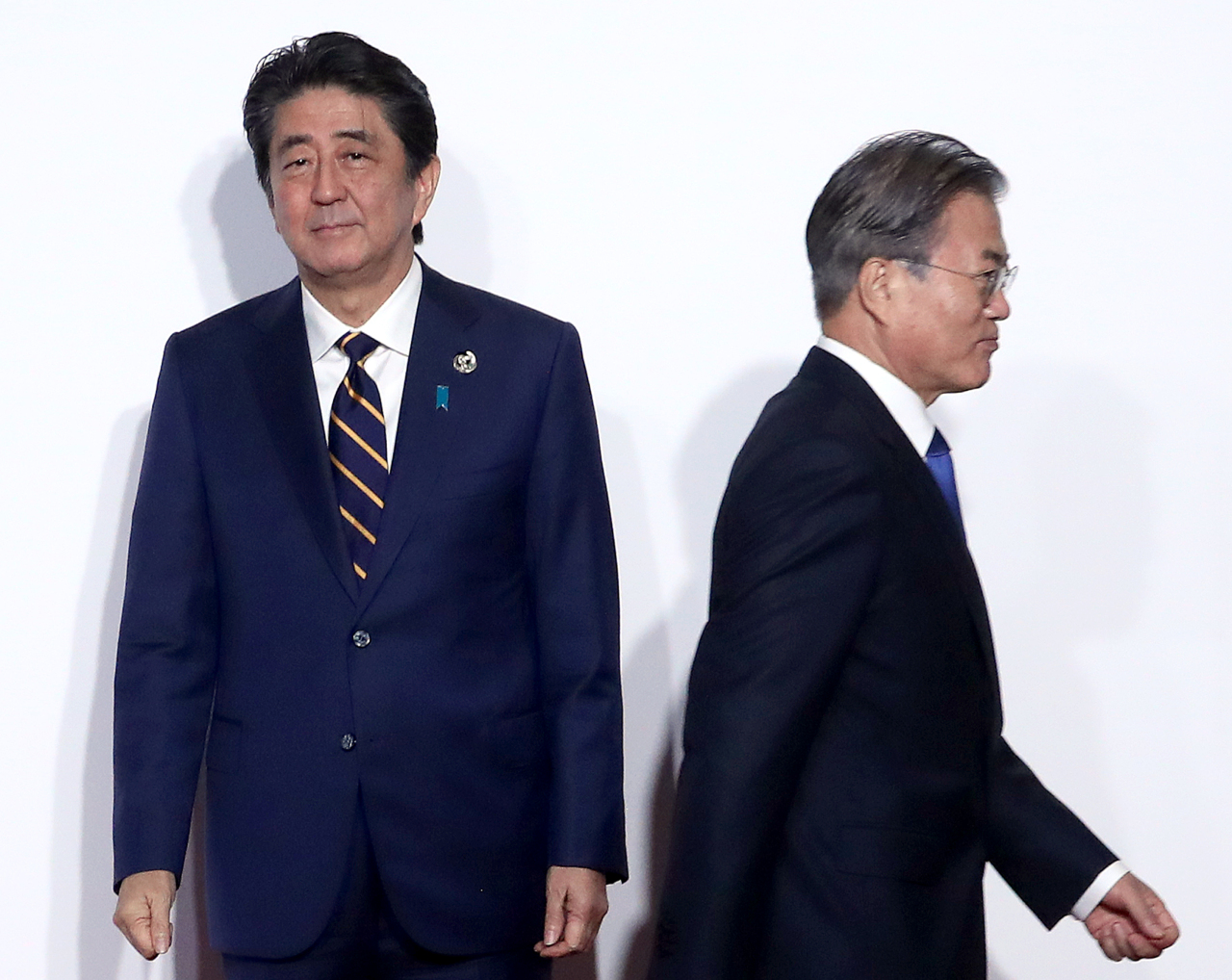Japan’s latest moves to curb exports of key materials used in South Korea’s high-tech industry is to be an agenda at the World Trade Organization’s General Council meeting next week amid mixed forecasts about the results.
The Moon Jae-in administration announced Sunday that it planned to use the upcoming meeting to explain its stance on Tokyo’s decision to apply stricter export rules for three materials used for producing chips and displays, and to remove South Korea from its “whitelist” for sensitive trade.
The General Council, which includes all 164 WTO members, is the organization’s top decision-making body aside from the Ministerial Conference that meets at least once every two years.
While Seoul’s decision to take the issue up in a more formal manner to the international trade body may have gained the approval of the public, doubts are being raised among experts on whether a WTO discussion can resolve the dispute.
 |
Japanese Prime Minister Shinzo Abe (left) meets South Korean President Moon Jae-in (right) at the 2019 G20 Summit held in Osaka, Japan on June 28. (Yonhap) |
“The term ‘trade spat’ is overshadowing everything, but Japan’s moves to remove South Korea from its export whitelist or a list of what it deems as trustworthy partners is hardly going to be perceived as a major issue by the WTO -- there are other countries that are not on the whitelist,” Lee Khan-pyo, professor of international management at Sogang University told The Korea Herald on Tuesday.
“Also, like Japan, the US has cited ‘national security concerns’ in restricting its trade with China, and placed a de facto sales ban on Huawei -- so there are precedents and evidence showing that the WTO cannot stop Japan’s campaign,” he added.
The Trump administration in May ordered the US treasury department to name Huawei as a national security threat, amid heightening trade tensions with Beijing.
If Tokyo removes Seoul from its whitelist, it would become more expensive and costly for Korean companies to obtain export licenses for key materials and technologies.
The removal is expected deal a major blow to the nation’s exports -- an annual loss of 30.5 trillion won ($27 billion) in exports, according to the Federation of Korean Industries.
Tokyo’s whitelist includes 27 countries including South Korea, the US, Germany, Poland and Italy. It excludes the world’s second-largest economy China, so by removing Seoul, Tokyo would merely be merely putting it in the same category as China, according to Lee.
“Several countries, including China, have been taking their grievances up to the WTO, with the Tump administration implementing tariffs on key exports and items, so there are doubts whether the WTO will favor South Korea in the dispute,” he said. “And let’s not forget that the WTO’s complaint process is notoriously slow.”
On Japan citing national security concerns behind its decision to limit exports of materials -- claiming some Korean companies have mismanaged the chemicals with potential military applications -- the New York Times earlier in the day paralleled the move to the Trump administration’s tendency to mix national security and economic priorities in his attacks on major trading partners.
It usually takes about 18 months to resolve conflicts involving actual lawsuits. The General Council meeting could therefore be seen as a preparatory step for an actual lawsuit.
“The meeting itself may not be significant, but if both countries see it as a chance to appeal to the member nations before an actual lawsuit, then it could work as a crucial turning point,” Kim Gyu-pan, a researcher at the state-run Korea Institute for International Economic Policy said. “The meeting needs to be a fact-checking process, though it’s difficult to place anymore weight on the meeting besides that.”
Experts also pointed out that the Moon administration must make it clear how far they are willing to take the dispute.
“While both Prime Minister Abe Shinzo’s government and President Moon Jae-in’s government are sticking to their guns and arguing about the core motivation for Japan’s move, neither side has yet taken any steps that suggest it is anxious to further aggravate an already tense situation,” Scott Seaman, director of Eurasia Group’s Asia division, said in a co-authored report.
“South Korean officials have warned that they are prepared to respond with their own measures, including a WTO case against Japan, if necessary. But they have also stressed that they want to resolve the dispute diplomatically and avoid engaging in a mutually damaging tit-for-tat exchange.”
Seaman added that the WTO General Council meeting is “a relatively low-key option to show the South Korean public that it is fighting back but do so in a way that keeps the dispute more confined within slow-moving, institutionalized channels removed from the domestic political fray.”
By Jung Min-kyung (
mkjung@heraldcorp.com)








